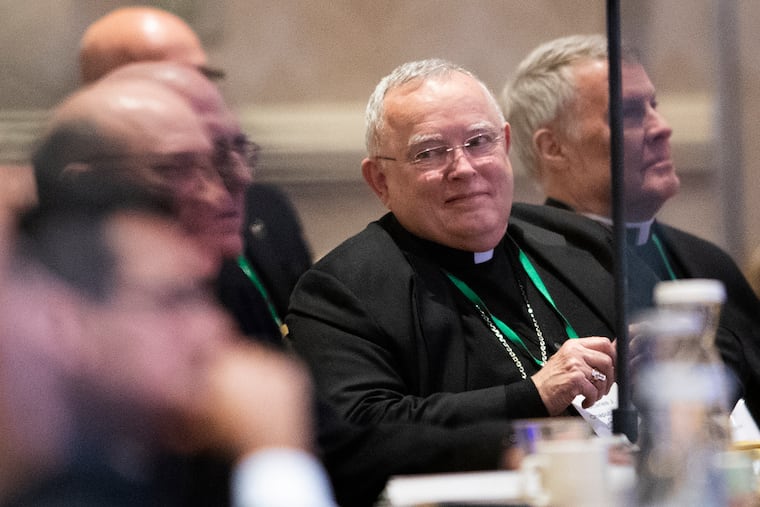Archbishop Charles Chaput: ‘You saw the job they tried to do on me?’ My run-in with the peeved prelate. | Maria Panaritis
The Catholic Archbishop of Philadelphia was turning down interviews with hometown media at the meeting of U.S. bishops this week. Except for this exchange with Inquirer columnist Maria Panaritis.

BALTIMORE — Inside a hotel ballroom along the waterfront here, many of the nation's Roman Catholic bishops have repeated a single, anguished refrain this week: Humility is in order. We, the high priests, are no longer trusted. The faithful see us as complicit in crimes against children for our handling of clergy sexual abuse. We must finally include ourselves in the firing line of justice.
Then there was Philadelphia Archbishop Charles J. Chaput.
In an encounter that lasted all of 83 seconds, the not-one-to-mince-words prelate spoke instead like a Jimmy Cagney brawler.
It happened during a break at the U.S. Conference of Catholic Bishops meeting on Monday. The bishops had been told that day that the Vatican wanted them to delay a vote on any proposal that would subject bishops to investigations run by lay people. I wanted Chaput's reaction.
I have been critical of the archbishop's efforts to block victims from suing the church. He was now among his peers at a historic gathering whose aim had been to reform church leadership. The Pennsylvania grand jury report in August had named hundreds of abuser priests across six dioceses. The U.S. Justice Department subsequently subpoenaed all eight of the state's dioceses. The faithful were fed up. How about Chaput?
"Maria Panaritis. Philadelphia Inquirer," I said. "Pleasure to meet you, archbishop." I found him in an aisle seat.
"Hi, Maria," Chaput said. "I've seen your stuff, of course. Never positive about us. Always negative."
"Well," I replied, "this is a tough scandal. This is a tough one."
I had just approached two other Pennsylvania bishops, Lawrence Persico of Erie and Edward Malesic of Greensburg. Both said they were surprised and distressed by the pope's request. I asked, why does the church need to delay action on a problem so well known since at least the 2002 Boston scandal?
For Chaput, the outrage was media coverage. He brought up an Inquirer story Monday that disclosed details of his handling of a seminarian harassment complaint in Colorado, when he was leader of the Denver Archdiocese.
"Did you see, you saw the job they tried to do on me this morning?" Chaput said.
No. I was in the car driving down here, I said.
A few hours earlier, this ballroom had filled with the monotone of hundreds of holy men chanting and praying. Now, I was in what felt like a scene from The Wire, with the archbishop playing the role of a disgruntled Baltimore City Hall politico.
"What do you think of the delay?" I asked of the Vatican shocker.
"I'm not going to say a word to you," Chaput replied. "I don't trust the Inquirer. You're out to get the church."
"Meaning what?" I asked.
"I'm not going to respond anymore," he said. "Your paper wants headlines and wants news."
"This is, I will tell you, the hardest story, journalistically, to do because of all of the broken hearts," I said.
"It is a lot of broken hearts," Chaput agreed. And we cordially parted ways.
Chaput, I later learned, was turning down all requests for interviews from Philadelphia journalists at the conference — an audacious move at a meeting whose primary function was to increase transparency.
There were many contradictions all week: Calls by some bishops for urgent action, gripes by others over the relentless scrutiny of their affairs. One bishop even praised the Trump presidency for taking the spotlight off the church.
The most deeply spiritual group I found, though, was outside. On the icy-cold waterfront.
A group of 33 Philadelphia-area parishioners had come to protest on Tuesday. They were demanding that the bishops listen to the laity. They were with a beloved priest, the Rev. Christopher Walsh, a straight talker of a more gentle ilk. Walsh often speaks, from the pulpit of St. Raymond of Penafort in Mount Airy, of the church's sins.
"Every other week, he's apologizing," said Geri Dennis, a parishioner and protester. "It's almost as if he's so ashamed that he can't change anything. But we are the change. That's what he tells us. We are the change."
In a YouTube video a few months ago, he said the laws of morality apply to all — even bishops.
For the Tuesday trek, Father Walsh chartered the bus, held a morning Mass for the group in Philly first, then breakfast, then prayer.
Ordained in 1999, Walsh, 49, has ministered mostly amid the winds of scandal. And yet, the son of a scaffolding man has been steady and calm.
"I'm called," he said, "to shepherd people through a very difficult time in the history of the church."
It is a humble message. One that his own bishop would do well to emulate.